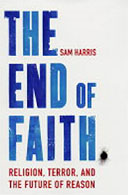The End of Faith

Some sort of deep scepticism about religion – not in terms of definition of whether God exists, but rather a concern about the institutions of religion – has been growing in my thoughts for some years. The book “The End of Faith: Religion, Terror and the Future of Reason” by Sam Harris hence appealed. Or the title did at least.
Despite the hard-hitting look of the cover, the book is an often less than coherent amalgam of philosophy, spiritualism, rational criticism of religious doctrine, and translates overall into some general kind of defence of ‘western’ values. The role of Christianity in US society gets a thorough roasting however.
The essence of what Harris is trying to say can probably be summed up by a quote on p. 215: “Faith is rather like a rhinoceros, in fact: it won’t do much in the way of real work for you, and yet at close quarters it will make spectacular claims upon your attention.” An inherent fear and distaste of faith pervades throughout the book.
This is underlined at all stages by the call for everything to be able to be proven: “The concessions we have made to religious faith – the idea that belief can be sanctified by something other than evidence – has rendered us unable to name, much less address, one of the most pervasive causes of conflict in our world.” (p. 29)
So what do we learn from Harris’s long list of complaints? It is hard to determine for sure. Perhaps this is just my inability to enter fully into the more philosophical details of what Harris writes, but how should we every day use the book’s arguments to good effect? That nothing is more important than the facts, that religious tensions are a zero-sum game, and that many of our more absurd opinions in our societies can be traced back to too literal interpretations of thousand-year old religious texts should surely be nothing especially new.
On the other hand, the resolute determination to direct criticism at faith, and to be willing to place religion honestly at the centre of the discourse about the war on ‘terror’ should be arguments we are willing to grasp. Why should faith be treated to any different standard of rigorous analysis than anything else in our society?
I’m sure this entry does not do justice to Harris or his work. The book is well researched and well written, although the structure and argument are hard to follow. For an intellectual breakdown on some of the dangers facing our society, it’s probably not a bad starting point.